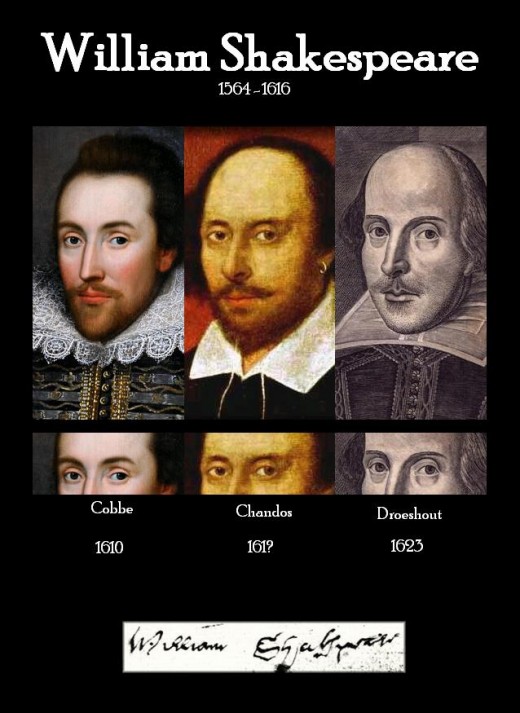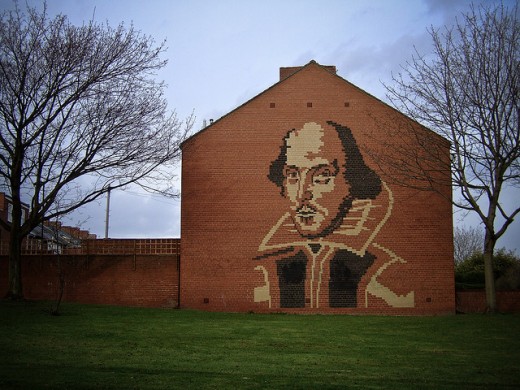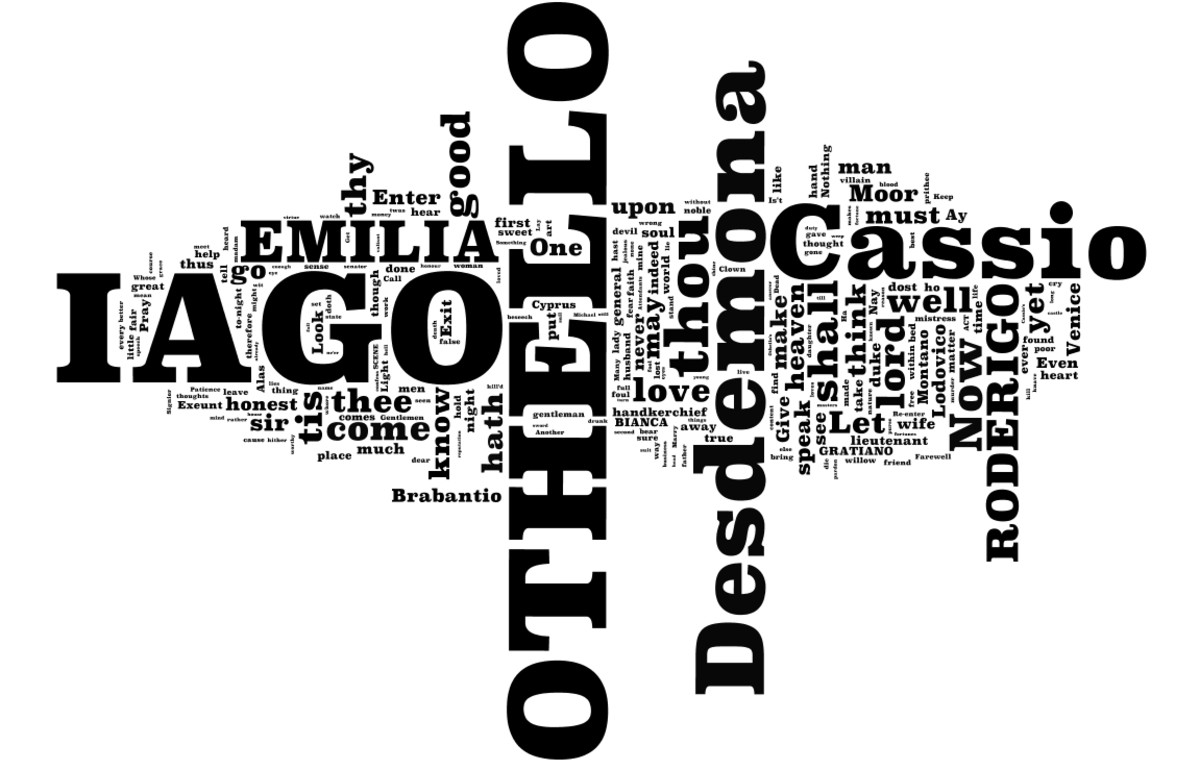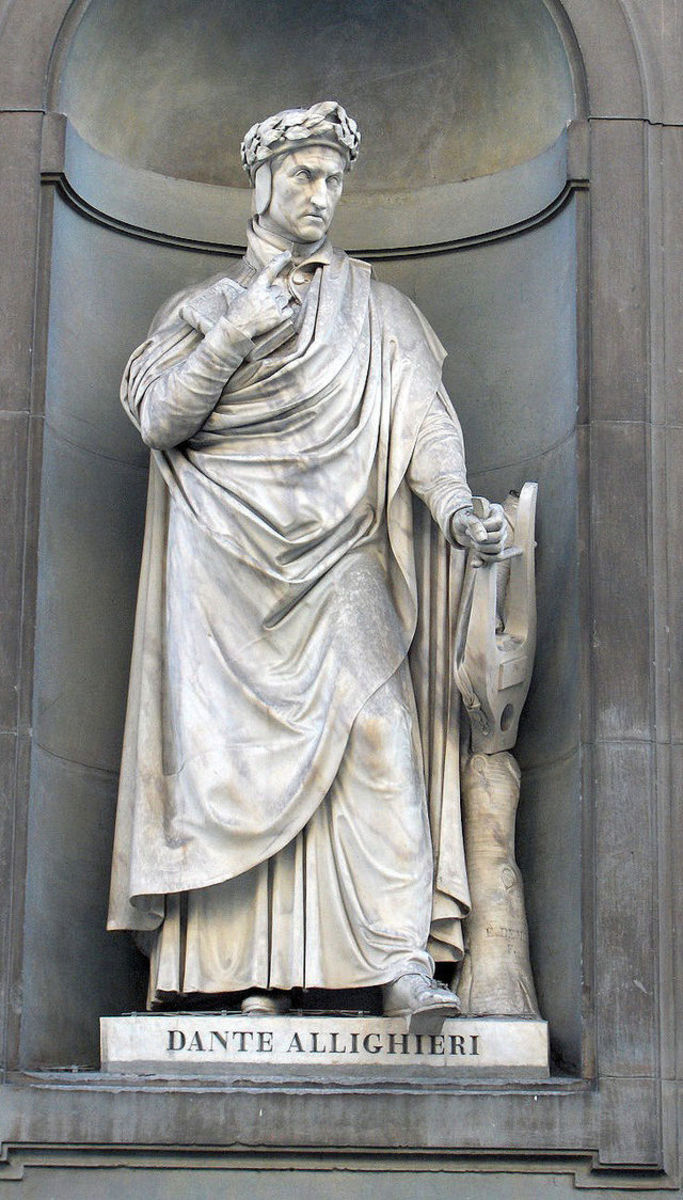Who is Shakespeare?
Who is Shakespeare?
Shakespeare: Man, Myth, Legend
Some might ask, 'Who was Shakespeare?"
Shakespeare's words, coined on dusty stages to eager audiences in Elizabethan England, trip off our lips daily. His cultural impact is still all around us. He is with us, as an ever-present force. So why do so few us know anything about him? A Shakespeare biography may strike some as dull reading indeed, but the average English-speaker might be surprised to learn how much we owe to this author, and how mysterious and tawdry was his life.
"To be or not to be" may be all you know of him now, but as I take you through William Shakespeare's life, you'll discover the mystery and charm of this most renowned English playwright.
Shakespeare's Bibliography
Shakespeare's bibliography demonstrates both the range and prolific talent Shakespeare possessed. His works fall into five general genres: Comedies, Tragedies, Histories, Late Romances, and Poetry. Additional works by Shakespeare may exist, but due to lack of scholarly evidence, remain neatly apocryphal.

Shakespeare's Tragedies
- Antony and Cleopatra
- Coriolanus
- Hamlet, Prince of Denmark
- Julius Caesar
- King Lear
- Macbeth
- Othello, the Moor of Venice
- Romeo and Juliet
- Timon of Athens
- Titus Andronicus
- Troilus and Cressida
Shakespeare's Comedies
- All's Well That Ends Well
- As You Like It
- The Comedy of Errors
- Love's Labour's Lost
- Measure for Measure
- The Merchant of Venice
- The Merry Wives of Windsor
- A Midsummer Night's Dream
- Much Ado About Nothing
- The Taming of the Shrew
- Twelfth Night
- The Two Gentlemen of Verona
Shakespeare Facts
Did you know...?
- Shakespeare did not publish a formal, authoritative version of his plays while he lived. Consequently, it's hard to pinpoint the most authentic versions of his works.
- Shakespeare fathered three legitimate children with his wife, Anne: Susanna (1583), and twins, named Hamnet and Judith (1585). Hamnet died for reasons unknown in 1596.
- The Shakespeare family finally received a coat of arms in 1596, in fulfillment of the wishes of John Shakespeare. The application cost 30 guineas and, upon approval, the Shakespeares gained the title 'gentleman' after their names and the right to display the coat of arms on their home and goods.
- Ben Jonson, seemingly clairvoyant, wrote of Shakespeare, "He was not of an age, but for all time!"
Shakespeare's Histories
- Henry IV, Part I
- Henry IV, Part II
- Henry V
- Henry VI, Part I
- Henry VI, Part II
- Henry VI, Part III
- Henry VIII
- King John
- Richard II
- Richard III
Shakespeare's Late Romances
- Cymbeline
- Pericles
- The Tempest
- The Two Noble Kinsmen
- The Winter's Tale
Shakespeare's Poetry
- The Sonnets
- Venus and Adonis
- The Rape of Lucrece
Shakespeare's Early Life
Birth Date
- April 23, 1564
Place of Birth
- Stratford-upon-Avon
Little about Shakespeare's life exists beyond the everyday information contained in church and legal documents. Under the relatively stable rule of Queen Elizabeth, English bureaucracy flourished, for which Shakespearean scholars the world over give thanks. One such bit of bureaucracy comes from the Holy Trinity Church - the baptism record for one little boy, born to John Shakespeare and Mary Arden on April 23, 1564.
One of eight children - a few of whom died young - Shakespeare grew up in a relatively affluent home. His father met with great success as a glover and leather merchant for the first several years of Shakespeare's life, while his mother was daughter and heiress to a wealthy landowner.
Education
While it's unclear how much education Shakespeare actually received and from where, it is clear that he acquired some learning from somewhere. His writings demonstrate a knowledge of Latin, Classical Greek, and the standard primer, or horn-book, for that time. Most scholars suspect that Shakespeare attended a free grammar school, King's New School of Stratford-upon-Avon, despite a lack of evidence to confirm as much.
Likewise, some scholars assume that the declining fortunes in the late 1570s of Shakespeare's father, John, precipitated William's removal from school. However, even this much is unclear, since only an extremely unreliable biographer (Robert Speaight) from the early 18th century makes note of it.
Shakespeare's "Lost Years"
1578 - 1582: Shakespeare Grows Up
From the time Shakespeare possibly left school until 1582, he left little indication of his existence. Scholars know nothing about this period of years for certain. Nothing, save his marriage in 1582 to an orphaned, pregnant heiress named Anne Hathaway.
1585 - 1592: Scraps and Whispers
Little more than scraps and whispers hint at what Shakespeare did and where he went in the years spanning 1585 to 1592. Some suspect he worked as a schoolmaster, others that he ran into legal difficulties related to a poaching incident with Sir Thomas Lucy, which necessitated a hasty exit from Stratford.
Shakespeare's Life in London
Shakespeare Arrives in London
Most scholars agree that Shakespeare stepped foot in London around 1588, at which time, he began seeking work as an actor and honing his craft as a playwright. Unsurprisingly, he wasted no time making waves from 1588 on, as this choice quote from the dramatist Robert Greene demonstrates: "There is an upstart crow, beautified with our feathers, that with his Tiger's heart wrapped in a player's hide, supposes he is as well able to bombast out a blank verse as the best of you: and being an absolute Johannes fac totum, is in his own conceit the only Shake-scene in a country."
Despite the vociferous disdain of some critics, most who came into contact with Shakespeare acknowledged and, indeed, admired his talent. In fact, Henry Chettle, Robert Greene's editor, later made a thorough apology to Shakespeare in the preface of his own work, Kind-Heart's Dream. In this lengthy apology, Chettle admits he had not been acquainted with Shakespeare at the time Greene wrote his harsh review, but having become acquainted with him since, could no longer agree with Greene's opinions. Rather, to Chettle, Shakespeare seemed both honest and deserving of all his accolades.
Shakespeare had truly arrived in London.

Critical Success and Shakespeare
By the time of Chettle's apology, several of his plays had become popular, including Henry VI and Titus Andronicus. He was touring with Pembroke's Men, sponsored by Henry Herbert, the Earl of Pembroke. Queen Elizabeth often invited Shakespeare and his troupe to perform for her at court. Most scholars agree that by 1592 and before, Shakespeare had been writing and acting with the troupe.
In 1592, however, Queen Elizabeth shut down the theaters of London due to worries over an outbreak of the plague. Shakespeare may have performed on the outskirts of London during this time, but some scholars think he focused on his poetry. In fact, the poetry he wrote at this time may be what caught the attention of the Earl of Southampton. While most scholars believe Shakespeare had known Southampton for a long time, based on evidence in Shakespeare's early sonnets, the matter lacks sufficient proof to be a certainty. Nonetheless, by 1593, Shakespeare had found in Southampton a patron, as well as formal recognition as not merely an actor and playwright, but also as a poet.
Come 1594, Shakespeare was writing, acting, and helping to manage the Lord Chamberlain's Men - also called the 'King's Men' once James I took the throne in 1603. Shakespeare and his troupe had become the most successful of its kind in London.
Shakespeare's Later Years
With the purchase and opening of the Globe Theatre in 1599, Shakespeare had a permanent venue for the performance of his plays. He also had a stake in the theater itself and was able to support his family very comfortably.
Shakespeare played a dangerous role in the politics of England at the time, as well. The first recorded production of Richard II was at the behest of the Earl of Essex, who was fomenting rebellion against Queen Elizabeth. Well-aware of and banking on the subversive nature of Richard II, Essex commissioned Shakespeare to stage it on February 7th, 1601, the night before Essex's revolt, which ultimately ended with the Earl's execution.
The years following the purchase of the Globe Theatre were the most productive of Shakespeare's career. He released Hamlet, found a patron after Queen Elizabeth's death in King James I, and released As You Like It, Othello, Macbeth, and many other essential Shakespeare works. His troupe, now the King's Men, bought the Blackfriar's Theatre, which became their winter home.
Shakespeare had acquired enough wealth to purchase land and a small cottage in Stratford, which added to his current holdings and further cemented his "gentleman" status. To these holdings Shakespeare retired in 1611, in comfort. He used this time to write his will.
Shakespeare's Death
Little is known about Shakespeare's death. After he slowed down in the years after 1611 - though he still managed to release The Tempest and Henry VIII - Shakespeare did little to offer modern scholars a reliable picture of the years between 1613 and his death in 1616. Less than a month before his death, in March 1616, Shakespeare's signs and finalizes his will.
It's possible that Shakespeare may have died from drinking to hard and becoming feverish. This suggestion is based on the diary of John Ward - a professed admirer of Shakespeare who wrote his diary fifty years following Shakespeare's death. Most scholars disregard John Ward as a credible source, though an outbreak of typhus at the time lends some feasibility to his suggestion.
Yet another clue comes from C. Martin Mitchell, who wrote extensively about Shakespeare's son-in-law, Dr. John Hall. Mitchell suggests that Shakespeare died from "cerebral hemorrhage or apoplexy that quickly deepened and soon became fatal" (Mitchell 79). While Mitchell supplies a handful of reasons for believing this to be the case, there's no evidence to support his claims. William Shakespeare's death remains and most likely will remain a mystery.
Shakespeare's tomb is in the chancel of Holy Trinity Church in Stratford. His epitaph bears the warning, "Good friend for Jesus sake forbeare,/To dig the dust enclosed here./Blessed be the man that spares these stones,/And cursed be he that moves my bones."
Shakespeare's Family
Was Shakespeare a Good Husband and Father?
Scholars know so little for certain about Shakespeare's family life. We know that Anne Hathaway married William Shakespeare, then a minor, for a certainty. Less clear is what happened after the birth of the Shakespeares' twins in 1585. We know that the Shakespeares had good friends, the Sadlers, who became godparents of the twins and after whom William named one twin. We also know that, in turn, the Sadlers named their son 'William.'
By the time the twin named after the Sadlers, Hamnet, died of an unknown cause in 1596, Shakespeare had been away from the family in London for years. Shakespeare may have made regular trips home, but his hectic schedule calls this possibility into question. Unfortunately, it seems most likely that Shakespeare neglected his family and that the death of his son wounded and eventually motivated him to spend more time with his wife and children.
Shakespeare bought a house in 1597 on the corner of Chapel Lane and Chapel Street, then the second largest house in Stratford. He may have bought this house to symbolize a renewed dedication to his family, or he may have expressed such dedication all along and purchased the house for other reasons, possibly as a suitable residence for a family in recent receipt of a coat of arms.
So Who is Shakespeare?
Shakespeare contributed a tremendous amount to our modern literature and common language, but as this biography shows, he led a tumultuous, busy, exciting, mysterious life. He stands as a paragon of Western Literature because of his contributions to our modern world; but he remains fixed in the academic community as much for his fascinating life as for his works.
To see Shakespeare's life and historical context in one quick overview, please review this Shakespeare timeline.
References
Works Consulted
Bentley, Gerald Eades. Shakespeare: A Biographical Handbook. New Haven: Yale UP, 1968.
Mabillard, Amanda. William Shakespeare of Stratford: Shakespeare's Education and Childhood. Shakespeare Online. 13 Aug. 2011. <http://www.shakespeare-online.com/biography/shakespeareeducation.html>.
Mabillard, Amanda. William Shakespeare of Stratford: Shakespeare's Children. Shakespeare Online. 13 Aug. 2011. <http://www.shakespeare-online.com/biography/shakespearechildren.html>.
Mabillard, Amanda. Shakespeare's Death. Shakespeare Online. 15 Aug. 2011. <http://www.shakespeare-online.com/biography/deathofshakespeare.html>.
Mabillard, Amanda. William Shakespeare of Stratford: Shakespeare as Actor. Shakespeare Online. 15 Aug. 2011. <http://www.shakespeare-online.com/biography/shakespeareactor.html>.
Mitchell, C. Martin. The Shakespeare Circle: A Life of Dr. John Hall. Birmingham: Cornish Brothers Ltd., 1949.
Additional Shakespeare Resources
- Complete Shakespeare Timeline
A complete timeline of Shakespeare's life and the events pertinent to understanding his context. - World Shakespeare Bibliography Online
A searchable electronic database consisting of the most comprehensive record of Shakespeare-related scholarship and theatrical productions published or produced worldwide between 1960 and 2011. - Shakespeare\'s Biography: Information on Shakespeare\'s Parents, Siblings, Career as Actor, Children
An in-depth and accurate resource on William Shakespeare, from your trusted Shakespeare source - Shakespeare Resource Center
You'll find here collected links from all over the World Wide Web to help you find information on William Shakespeare. There are millions of pages that reference Shakespeare.




